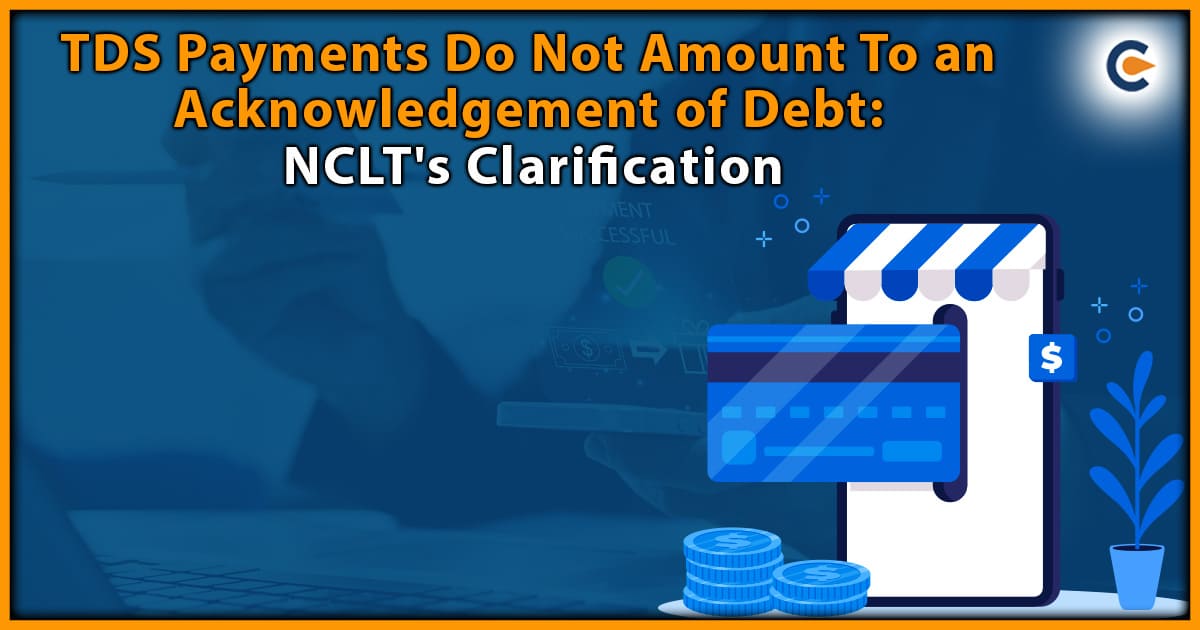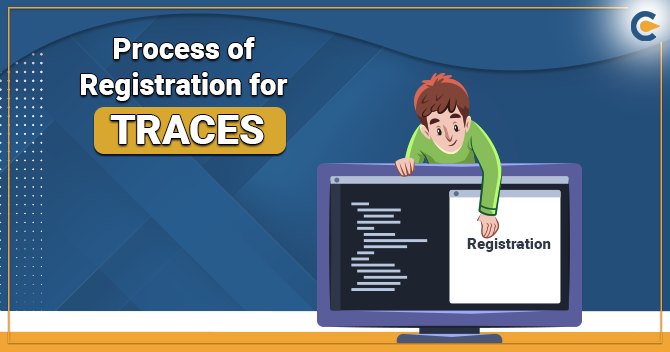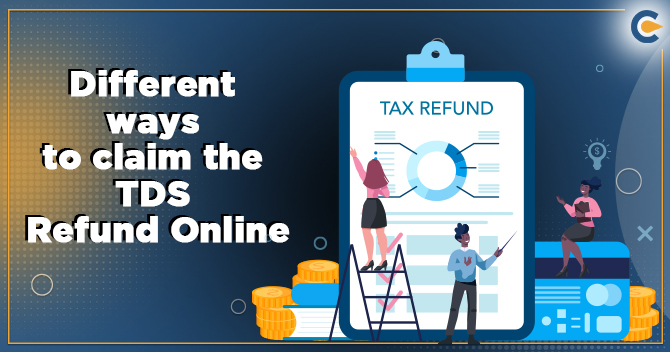Tax Deducted at Source (TDS) is a mechanism implemented by the Indian government to collect taxes at the source of income. It requires the payer to deduct a certain percentage of the payment made to the payee and remit it to the government. While TDS payments play a significant role in tax compliance and revenue collection, there has been a long-standing debate regarding their legal implications in relation to the acknowledgment of debt. In a recent ruling, the National Company Law Tribunal (NCLT) has provided much-needed clarification on this matter. The NCLT has emphasized that TDS payments should not be considered as an acknowledgment of debt. This ruling has important implications for businesses and individuals involved in disputes over outstanding dues, shedding light on the legal interpretation of TDS payments.
Understanding TDS
Tax Deducted at Source is a mechanism implemented by the government to collect taxes at the source of income. It is a method of indirect tax collection where the person making a payment deducts a certain percentage of the amount and remits it to the government on behalf of the payee. The payee can then claim credit for the TDS amount while filing their tax return.
The primary objective of Tax Deducted at Source is to ensure that taxes are collected in a timely manner and to reduce tax evasion. It applies to various types of transactions such as salary payments, interest income, dividends, rent, professional fees, and more. The TDS rates vary depending on the nature of the payment and are determined by the government. TDS is applicable to both individuals and businesses. Employers deduct TDS from employees’ salaries, banks deduct TDS on interest earned, and companies deduct TDS on payments made to contractors, vendors, or service providers. The deducted TDS amount is then deposited with the government within a specified time frame.
For the payee, Tax Deducted at Source serves as a pre-payment of their tax liability. The payee can claim credit for the TDS amount while computing their total tax liability for the financial year. If the TDS deducted is higher than the actual tax liability, the payee is eligible for a refund. Conversely, if the TDS is lower, the payee must pay the remaining tax amount.
TDS payments are accompanied by various compliance requirements. The payer must obtain a Tax Deduction and Collection Account Number (TAN) and deduct TDS at the prescribed rates. They are also required to issue a TDS certificate to the payee, which serves as proof of tax deduction. The payee must ensure that the Tax Deducted at Source certificates are obtained and correctly reflected in their tax return to claim credit for the TDS amount. It is important to note that TDS payments do not absolve the payee from their overall tax liability. The TDS amount is only a portion of the total tax payable. The payee must calculate their total income and taxes due, considering factors such as other sources of income, exemptions, deductions, and applicable tax rates.
Tax Deducted at Source is a mechanism implemented by the government to collect taxes at the source of income. It serves as a pre-payment of taxes for the payee and ensures timely tax collection. Understanding the rules and compliance requirements related to TDS is essential for both payers and payees to fulfill their tax obligations accurately and avoid any penalties or disputes.
TDS Payments And the Acknowledgement of Debt
Tax Deducted at Source payments and the acknowledgment of debt are two distinct concepts with different legal implications. It is important to understand the difference between them, as misconceptions can arise regarding the relationship between TDS payments and the acknowledgment of debt.
- TDS Payments
Tax Deducted at Source is a mechanism implemented by the government to collect taxes at the source of income. The person making a payment deducts a certain percentage as tax and remits it to the government on behalf of the payee. TDS payments are purely statutory in nature and are designed to ensure tax compliance and proper revenue collection. The primary purpose of TDS is to collect taxes from the income earned by the payee and facilitate the smooth functioning of the tax system.
- Acknowledgment of Debt
An acknowledgment of debt is a legal recognition or admission by the debtor that they owe a certain amount to the creditor. It is a voluntary act and can take various forms, such as a written communication, a promissory note[1], or a legally recognized agreement explicitly stating the existence of a debt.
Relationship between Tax Deducted at Source Payments and the Acknowledgment of Debt: TDS payments should not be equated with an acknowledgment of debt. While TDS payments involve the deduction of tax from the payment made to the payee, they do not signify any admission of liability or acknowledgment of a debt by the payer. TDS payments are mandated by law and are not intended to determine the underlying transaction or settle outstanding dues. They are solely aimed at ensuring tax collection and compliance.
It is crucial to understand that TDS payments alone cannot be considered as conclusive evidence of the existence of a debt or an acknowledgment of liability. In cases of disputes over outstanding dues, other forms of evidence, such as written communications, invoices, contracts, or legally recognized agreements, are required to establish the acknowledgment of debt. TDS payments and the acknowledgment of debt are separate concepts. TDS payments are statutory in nature and serve the purpose of tax collection, while an acknowledgment of debt involves a voluntary admission of liability. Understanding this distinction is important to avoid any misconceptions or misinterpretations when dealing with financial disputes or legal matters related to outstanding dues.
The NCLT Ruling
The National Company Law Tribunal (NCLT) ruling has provided significant clarification regarding TDS payments and their relationship to the acknowledgment of debt. The ruling emphasizes that TDS payments made by a debtor should not be considered as an acknowledgment of debt.
The NCLT has clarified that TDS payments are purely statutory in nature and are not indicative of any admission of liability or acknowledgment of a debt by the payer. The purpose of TDS is to ensure tax collection and compliance, and it does not extend to determining the underlying transaction or settling outstanding dues. According to the NCLT, TDS payments cannot be relied upon as conclusive evidence of the existence of a debt. In cases of disputes related to the acknowledgment of debt, parties must present other evidence or legally recognized documents to substantiate their claims. The ruling highlights the importance of considering additional evidence, such as written communications, invoices, agreements, or any other legally recognized documents, to establish the acknowledgment of debt.
The NCLT’s ruling provides clarity on the legal status of TDS payments in relation to the acknowledgment of debt. It aims to prevent the misuse or misinterpretation of TDS payments as an admission of liability. The ruling ensures that businesses and individuals involved in financial disputes understand that TDS payments alone are not sufficient to establish the acknowledgment of debt, and other forms of evidence are necessary to support their claims or defenses. It is essential for businesses and individuals to be aware of this ruling and its implications when dealing with outstanding dues or disputes over debts. Seeking legal advice and presenting appropriate documentation is crucial in such situations to ensure a fair and accurate resolution of financial disputes.
The NCLT ruling clarifies that TDS payments should not be considered as an acknowledgment of debt. It emphasizes the need for additional evidence or legally recognized documents to establish the existence of a debt in cases of financial disputes. The ruling serves as a guiding principle for interpreting the legal implications of TDS payments and ensures a fair resolution of disputes related to outstanding dues.
Implications For Businesses and Individuals
The NCLT’s ruling regarding TDS payments and the acknowledgment of debt has several implications for both businesses and individuals involved in financial disputes. Understanding these implications is crucial for effectively navigating such situations. Here are some key implications:
- Documentation and Evidence: The ruling emphasizes the importance of maintaining accurate and comprehensive documentation in financial transactions. Businesses and individuals should ensure they have appropriate documentation, such as written communications, invoices, agreements, or any legally recognized documents, to substantiate their claims or defenses. Relying solely on TDS payments as evidence of the acknowledgment of debt may not be sufficient.
- Legal Strategy: When faced with disputes over outstanding dues, businesses and individuals need to reassess their legal strategies. It is advisable to seek professional legal advice to understand the implications of the NCLT ruling and develop a robust legal strategy that incorporates the required evidence beyond TDS payments.
- Contractual Agreements: Parties entering into financial transactions should carefully draft and execute legally recognized agreements that clearly state the terms and conditions, payment obligations, and the acknowledgment of debt, if applicable. This can help avoid ambiguity and provide a stronger foundation in case of future disputes.
- Dispute Resolution: The ruling can impact the approach to dispute resolution. Businesses and individuals involved in financial disputes should consider alternative methods of dispute resolution, such as mediation or arbitration, to find mutually agreeable solutions. These methods can help avoid lengthy legal battles and provide a more efficient and cost-effective resolution.
- Compliance and Record-Keeping: The ruling reinforces the importance of complying with tax laws and maintaining accurate records. Businesses and individuals should ensure they are adhering to TDS regulations, obtaining the necessary TDS certificates, and maintaining proper documentation related to financial transactions. This ensures compliance with tax obligations and provides a stronger position in case of disputes.
- Awareness and Education: The NCLT ruling serves as a reminder for businesses and individuals to stay updated with legal developments and interpretations regarding TDS payments and the acknowledgment of debt. Regular awareness and education on tax laws and related legal aspects can help prevent misunderstandings and misinterpretations.
The NCLT’s ruling has implications for businesses and individuals involved in financial disputes. It emphasizes the importance of proper documentation, legal strategy, contractual agreements, compliance, and dispute resolution methods. Being aware of these implications and seeing King’s professional advice can help navigate financial disputes effectively and ensure a fair resolution based on comprehensive evidence beyond TDS payments.
Additional Implications of The NCLT Ruling
Apart from clarifying the relationship between TDS payments and the acknowledgment of debt, the NCLT ruling has additional implications that warrant attention.
- Strengthening Legal Certainty: The NCLT’s ruling strengthens legal certainty by defining the boundaries of TDS payments and their role in acknowledging the debt. By clearly stating that TDS payments are purely statutory in nature, the ruling prevents any potential ambiguity and misuse of such payments as evidence of debt.
- Importance of Proper Documentation: The ruling highlights the significance of proper documentation in debt-related disputes. Parties involved in financial transactions must ensure they maintain appropriate records, such as contracts, invoices, and agreements, to establish the existence and terms of the debt. Relying solely on TDS payments can be insufficient in establishing the creditor-debtor relationship.
- A necessity for Diligent Legal Evaluation: Parties engaged in disputes involving outstanding dues should seek professional legal advice to understand the nuances of the ruling and its implications on their specific case. Legal experts can help assess the strength of the available evidence, identify any gaps, and determine the most effective approach for resolving the dispute.
- Adherence to Statutory Obligations: The ruling underscores the importance of fulfilling statutory obligations related to TDS payments. Businesses and individuals must diligently comply with their TDS obligations to avoid potential repercussions. Adherence to tax laws and regulations remains crucial, irrespective of their impact on the acknowledgment of debt.
- Encouraging Alternate Forms of Resolution: Given that TDS payments alone do not constitute an acknowledgment of debt, parties involved in disputes may be more inclined to explore alternate methods of resolving their differences. Negotiations, mediation, or arbitration could offer mutually beneficial outcomes by considering a broader range of evidence and factors.
Conclusion
The NCLT’s ruling provides valuable clarity regarding TDS payments and their relationship to the acknowledgment of debt. By affirming that TDS payments do not amount to an admission of liability, the ruling ensures that parties involved in financial disputes understand the limitations and legal implications of relying solely on such payments. It reinforces the need for proper documentation, legal evaluation, and adherence to statutory obligations while emphasizing the importance of considering a comprehensive range of evidence when resolving disputes. As businesses and individuals navigate the intricacies of debt-related matters, this ruling serves as a vital reference point for a fair and equitable resolution of outstanding dues.
Read Our Article: TDS Not Applicable To Salary Or Commission For Partners: ITAT Ruling











